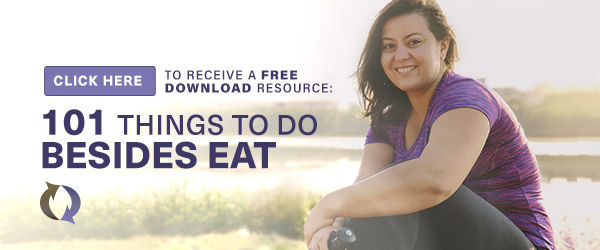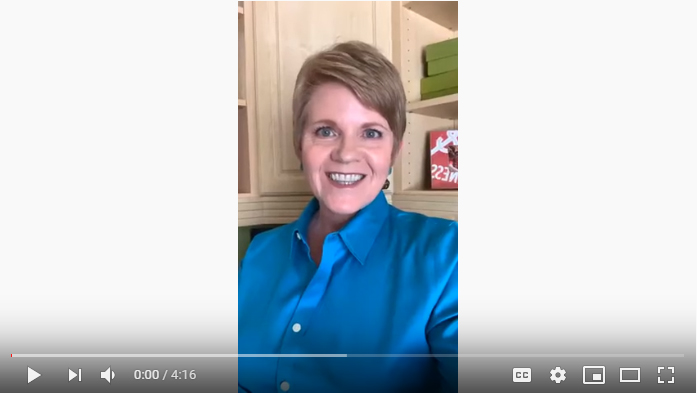We’ve all seen the memes about “gaining the Covid-19.” I’ll admit that I chuckled at the wordplay the first time I saw it, but the more memes I saw, the more concerned I became about the harm these “weight gain during Coronavirus” memes will cause. I think it is time to put these memes in lockdown to prevent the dangerous spread of fatphobia, diet culture, and emotional eating-shaming.
Let’s explore the potential harm I’m talking about here…
Fear of “gaining the Covid-19” stems from fatphobia
The fear of weight gain stems from our culture obsession with thinness. The implication that gaining weight during lockdown would be a terrible outcome (when there are clearly many worse things that can happen during this pandemic), says, “Being fat is a terrible thing to be.”
Let me put it a different way. Let’s say you share a “before and after” Covid-19 meme. Your sister-in-law, neighbor, or daughter who happens to be 19 pounds heavier (or more) than you sees it in your feed. What message are you sending to them?
“Becoming your size would be awful.”
That is the nature of fatphobia and this is a great time to sensitize yourself to the hurtful messages that show up in social media all time!
Hurtful memes are not funny!
If you’ve ever seen me deliver a keynote or participated in one of my retreats or workshops, you know I love to use humor to teach—but never when it might cause others to feel shame, as these memes could. So before you say, “Have a sense of humor! We all need a laugh right now!,” remember that history has taught us that humor can sometimes be hurtful and harmful.
As Regan Chastain said in her post on this topic, “it’s not that I can’t ‘take a joke’ made at my expense that harms me, it’s that I shouldn’t have to.”
Let’s stop normalizing our obsession with weight
Weight-stigma, restrictive eating, and disordered eating are so common in our culture (hence the term “diet culture”), that these memes seem harmless because they simply reflect the diet- and weight-focused conversations that go on around us constantly in-person and online.
Telling people how worried you are about gaining weight in the midst of a life-threatening pandemic underscores how pervasive this obsession is. Sharing these memes is unhealthy and counterproductive and is far more likely to do harm than good.
Weight gain memes are triggering
Further, many people have or had an eating disorder. As this article explains, in addition to the challenges we all have in coping with the emotions like isolation, loneliness, scarcity, and fear, someone with an eating disorder may struggle with heightened anxiety about eating and behaviors such as restricting, bingeing, or purging.
Since these “weight gain during Coronavirus” memes can be very triggering to those who have an eating disorder or disordered eating, not sharing these memes helps protect the most vulnerable among us (similar to staying at home to protect our most vulnerable from Covid-19).
Emotional eating is a normal human response to stress!
Another problem with these “weight gain during Coronavirus” memes is they pile shame and guilt on to a normal, healthy human response to stress: Emotional eating. (More about that in my article Embrace Emotional Eating.)
Rather than “emotional eating-shaming,” recognize that the urge to get a snack is simply a natural desire to soothe the discomfort you may be feeling.
So here are 9 steps (excerpted from Eat What You Love, Love What You Eat) to help you engage fully and mindfully in the act of eating to soothe the fear, isolation, and sometimes boredom you may be feeling.
9 steps to managing emotional eating during the Coronavirus pandemic
- Pay attention to your body’s cues about what you need. Is your body wisdom trying to tell you need food, movement, rest, water, connection, calm, entertainment, or something else?
- When you are hungry, there is no better way to take care of yourself than to mindfully enjoy delicious, nourishing (or not so nourishing) food!
- If you find yourself needing comfort, choose a comfort food from your childhood or a pleasurable food from a favorite restaurant you’ve been missing.
- Add connection when possible. Share your meal with others at your table – or virtually!
- Enjoy your meal mindfully. Fully engage in eating by savoring the appearance, aromas, textures, and flavors of your food. Mindful eating acts as a mini-meditation that is very calming and centering to the mind.
- Pay attention to the subtle symptoms of satiety so you are able to move from eating to another activity before you feel overly full and uncomfortable. Remember, you are eating to feel better, not worse!
- If you want to eat and recognize that you don’t have any physical signs of hunger, you may still choose to eat! Just remember then that the primary purpose for eating is comfort, pleasure, and/or distraction. Therefore, steps 1 through 6 are more important, not less. (Eating fast while watching TV is not likely to be nearly as pleasurable!)
- If you realize you are not hungry, recognize the opportunity to name and feel the emotion(s) you are experiencing.
- Is there a need you can identify such as comfort, connection, a break, rest, fun? What small step can you take right now to meet that need? Putting on some music? Texting a friend? Walking outside for a bit? Playing a game with a friend? You get the idea!
So, do your part! Stay inside, wash your hands, and lock down these “gaining the Covid-19” memes. Remember, be kind to one another – and to yourself!
Enjoyed this article? Here are three more you might like:
Mindful stress management during the Corona virus pandemic
End weight stigma… starting with your own.
Emotional eater? Label the behavior, not yourself.


